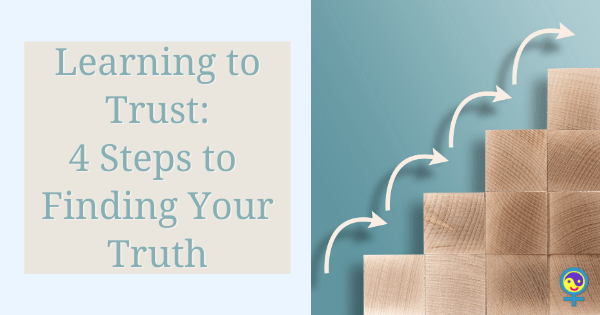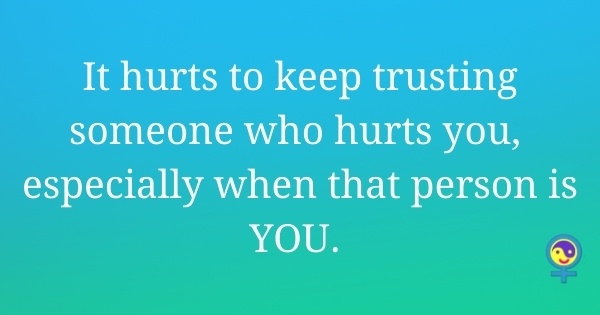4 Steps to Finding Your Truth

Thanks for joining me for more insight on learning to trust yourself! Hopefully, you already checked out the last blog [“Learning to Trust Yourself: Part 1”] where we talked about how our beliefs can cause us to doubt our decisions. Now, we’re going to get a little bit more detailed as we go through four steps that can help us find our truth and feel more confident about the decisions we make.
Before we go any further, I need to admit that I am not an expert on any of this. I am just learning as I go. I have made a great many poor decisions that completely ignored my intuition. I have accepted unacceptable behaviors from people, giving them multiple chances when they only deserved one. The result has been a lot of heartache and shame. There have also been moments where I’ve lost trust in myself completely, making it difficult for me to make any decisions at all. I don’t want anyone else to have to experience such difficulties. The steps I discovered below seem to be working for me so far. I’m hopeful they will help us all make decisions that leave us healthier and happier.
Step 1 – Establish Your Compass
While this first step may seem counterintuitive, if you’ve been manipulated or clouded by faulty beliefs, it is essential that you get foundational support from a safe, supportive person. This person, whom I like to think of as a “compass,” knows you and your true nature and is able to offer advice that is totally in support of your highest good. Most times, this is someone who can be impartial, like a therapist or coach, but a trusted friend or close family member can also work.
My main “compass” is my best friend of over 20 years, Chelle. She is sensitive and compassionate, but also incredibly fair and balanced. More importantly, she truly wants me to be happy, just as I want the same for her. Our friendship is a rare gift.
Chelle is a reliable source of support. Luckily, the same is true of other people in my life – my Mom, my sister, my boyfriend, and my dearest friends. They all offer insight. However, since they love me and don’t want to disappoint me, they can’t always offer the tough love that’s needed. At those times, I turn to professionals like therapists or energy healers who can evaluate my situation without any emotional attachment.
Of course, the point is not to lean on another person for all your decisions. You just want to be able to safely check-in when you’re feeling the need for an objective, unbiased, loving opinion until your ability to trust yourself grows stronger.
Step 2 – Watch for Red Flags
It’s sad to think that you have to be on guard, but the truth is you do. As my boyfriend always says, “trust, but verify.” You can initially give people the benefit of the doubt, but watch them carefully for anything that feels off. The following signs indicate that a situation or person may not be worthy of your trust:
You Experience Confusion or Self-Doubt
If you are feeling any confusion or self-doubt around someone, you need to take a step back and assess what’s going on. There’s a technique called gaslighting that manipulative people use to get what they want. The person makes you question your sanity. They do this in subtle, yet utterly maddening ways by changing the facts or denying information repeatedly.
My ex-husband did this to me during our divorce negotiations. I was overly generous with what I was willing to accept, yet every time we sat to discuss things he went into a tantrum that I was leaving him with nothing, claiming he wouldn’t be able to afford to live. The numbers were obviously in his favor, yet he was so convincing that I worried I was being unfair. When I presented all the details to an impartial professional, she got very stern with me and told me that I wasn’t asking for nearly enough. It turned out my ex was playing the victim to toy with my emotions, as he had done throughout our relationship. After speaking with other women who have been through a divorce, I understand this is a common tactic.
In retrospect, I’ve had this dynamic play out many times in life where people presented themselves as victims, when in reality they held all the power. Facts don’t lie. I said this in the last post, and it bears repeating, if something feels off it probably is. Sometimes, you have to separate yourself from the emotions and stick solely to the facts.
You Are Being Told Lies or Half-Truths
Lies are a huge red flag. Healthy people with integrity and strong values don’t lie. I’m not talking about the little white lies that protect another person’s feelings. I’m talking about a genuine lie when someone blatantly says something that is not true, or they change their story dramatically from one moment to the next, or depending on the audience.
A former colleague lied to me constantly. From our very first interaction, much of what she told me was untrue. Over time, I started to see lies pop up even over trivial things. I actually think she believed her own lies, which made them difficult to detect.
Although I saw the truth right from the start, I brushed it aside thinking it was no big deal. It was a good job and I needed the money, so denying my intuition felt easier. It wasn’t easy though. Dealing with a liar twists your mind into a pretzel. By the time I left that job I was totally confused and afraid to trust anyone.
The bottom line – as soon as you see someone’s true colors you must accept it and deal with the reality accordingly. People don’t generally change and liars can never be trusted.
You Experience Poor Health or Anxiety
Our bodies alert us when something is wrong in our lives. While illness has many different causes, denying the challenges in your life is definitely a cause for dis-ease. In terms of the job I just mentioned, I got sicker and sicker until it was hard to get out of bed. Several health professionals told me I had to leave or I would never feel better. They were right. Once I left, my energy and joy returned.
If we disregard the messages we get through our emotional and spiritual connections, we may fuel autoimmune conditions and the pain response. In short, if we allow our spirit to be attacked by others, our body may begin attacking itself.
I have had thyroid disease since my early 20s. Many healers see that condition as the result of an inability to speak our truth, which blocks the energy flow of the throat chakra. Some healers theorize this is why women, who are known to stay quiet to keep the peace, are more likely than men to struggle with thyroid issues (and other autoimmune conditions.)
Anxiety and digestive issues have also been especially clear red flags for me that something was off. These issues generally manifest in the lower chakras, which are considered to be the source of our sense of security and power. Even if you don’t believe in energy medicine and the chakra system, it isn’t too hard to see that when we suppress our feelings or deny what we know to be true, it results in a physical response. If you have health issues, think about where those issues are occurring in your body and consider what these symptoms might be telling you. Like facts, the body doesn’t lie.
Step 3 – Allow Yourself to Leave

When you know something is off, and you are trying to honor your intuition, it’s best to cut your losses as quickly as possible. This is where I struggle the most. Cutting people off or leaving situations is very difficult. There is always collateral damage and hurt feelings. In addition, there are positives in even the worst situations. If you live with a gratitude mindset, you may be prone to focusing on the good and downplaying the bad.
You end up feeling like you’re stuck on a hamster wheel. You don’t want to leave because you know it will be painful, and the unknown is scary. However, the longer you stay, the more damage is done, and the more you beat yourself up for not honoring the voice inside of you that knows you should go.
It hurts to keep trusting someone who hurts you, especially when that person is YOU. The only remedy to this paradox is to jump off the wheel! You must go and not look back.
One healthy way to do this is to focus on the lesson learned from the interaction. As we go through challenges, we fulfill life lessons that help us get stronger. Although the lessons sometimes feel terrible, they’re ultimately a helpful and necessary part of our growth.
Another essential piece in this step is forgiving yourself for disregarding your inner voice to begin with. When you are sensitive and thoughtful, it’s pretty easy to forgive others for their shortcomings, it’s much more difficult to forgive yourself. Again, I know this far too well, and it’s something I must work on all the time. We can’t fully trust ourselves until we’ve forgiven ourselves.
Step 4 – Be Still and Listen For Your Inner Knowing
The interesting thing about intuition, or inner knowing, is that it’s available to us at all times. Like many gifts, we are born with it, but through societal conditions and the challenges of life, we forget how to access it. That is why this (and the last post) are so darn long! There is a lot to unpack. How ironic that there are so many blocks and barriers to remove, just to access what is already there.
Once you have removed all the doubts, fears, and confusions, finding your inner voice is simply about getting still and listening. Meditation or prayer can help to focus and quiet your mind so that you get a sense of what really feels right. Asking yourself questions and then journaling the answers is also effective. But, for the most part, there isn’t anything fancy that needs to be done. You simply need to give yourself quiet and space to sit with your thoughts and the feelings that accompany them. As mentioned previously, your intuition or gut instinct is usually fast. It’s generally the very first reaction you have to something. The more you honor it, the stronger it becomes.
Practice, Practice, Practice
If you’re struggling with trusting yourself, please know you are not alone. This is a very common issue for empaths, sensitive people, or really anyone who is used to putting others first. It’s a hard pattern to unlearn, so it requires consistent practice. Give yourself the time to work through all your feelings of hurt and distrust. You must release all the negative energy around them, so they don’t cloud your judgment moving forward.
More Support:
While writing this post I came across this excellent video from Terri Cole. The tips shared are very helpful in being able to avoid manipulation which is a key piece of trusting yourself.
Michelle Gibeault Traub is a health writer, compassionate coach, and the author of Online Dating for Sensitive Women. Her mission is to help women be their best in body, mind & spirit.
Sign up for Michelle’s FREE Gifts – The Natural Healing Toolkit and 33 Ways to Add More Joy to Your Life.
